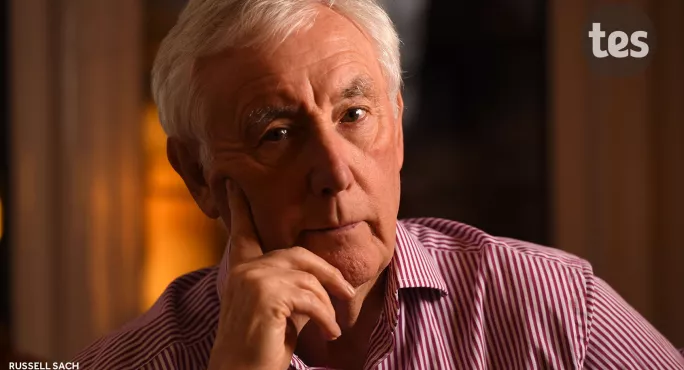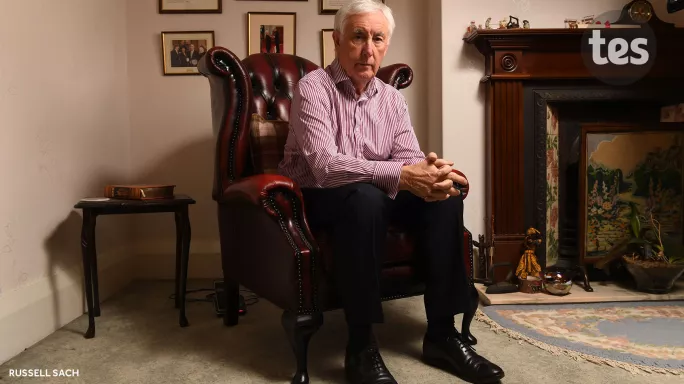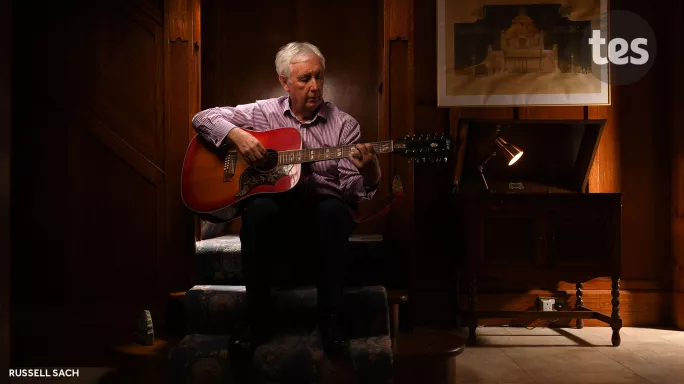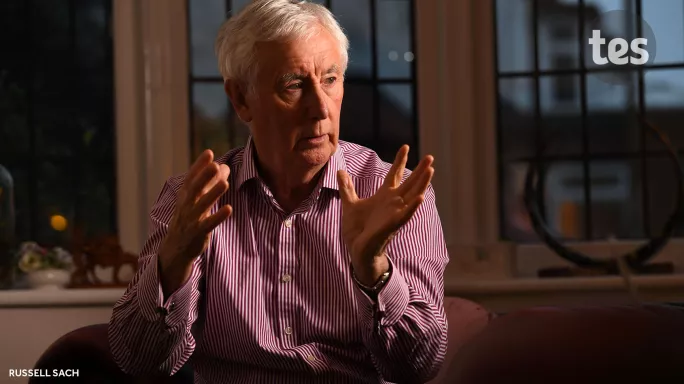
- Home
- ‘Teachers want to teach, the system is stopping them’
‘Teachers want to teach, the system is stopping them’

“You start with the assumption that children are born to learn, teachers want to teach, people want to do a good job and what is stopping them is the system.
“Your job as a headteacher then is not to motivate or even to encourage them but actually to ask ‘what is stopping you doing a good job and how can I remove that barrier?’”
Throughout a life in education, Les Walton believes that where he has made a difference it is because he has been able to influence what he refers to as “the system”.
Exclusive: DfE plans new improvement hubs
Adviser: Government adviser speaks out against grammar schools
Improvement: Heads look at impact of peer reviews
Walton’s career has seen him directly involved in almost all the significant changes in the education landscape stretching back to the 1960s when he started teaching in a secondary modern, which then became a comprehensive.
Over time he has been a highly successful headteacher, council education director, overseen the merger of two further education colleges, chaired a government funding agency, run an education company and chaired a major multi academy trust.
And now at the age of 74 he is setting his sights on “radically re-engineering” the way support is provided to schools by ensuring those delivering school improvement are qualified to do so.
Despite having worked in many national roles, Walton has never left his native North East. He meets with Tes at his Newcastle home.
The North East matters to him. He grew up in a small pit village in North West Durham and hails from a community of coal miners and quarrymen.
On the walls of his lounge are pictures that capture this family history. They include sketches of iron and coke works where his father once worked.
‘I always wanted to be a teacher’
Reflecting on his childhood, Walton says: “I don’t like the term working class. It’s a label. It niggles me when I hear people say that the working class lack ambition.”
His family had been coal miners for generations. His grandfather “cleaned the latrine in the pit from the age of 12”.
“My father’s only ambition for me was that I had a job with clean hands. At one time I used to think that he didn’t have a lot of ambition for me. But when you think about it this was a massive ambition for someone who had no idea about higher education, about professional jobs at all.”
Walton was to fulfil that ambition. He attended grammar school and from there became a teacher.

“In those days we were given a choice. You went to university or you chose a middle-class profession. Banking, civil service, customs and excise or teaching. I just decided I want to be a teacher. Very early on. About 14 years old. I always wanted to be teacher.”
During his education he had to overcome both the death of his sister who was 14 and then the death of his father.
He recalls struggling in school afterwards and being criticised for not being able to concentrate. But he was still able to pursue his goal of becoming a teacher. And when he secured his first job in 1966 it was at a school next door to the graveyard where both his father and sister were buried.
“It was something that was so strange. I was overlooking them,” Walton says.
He began teaching at a secondary modern that would become part of Blaydon comprehensive school when it merged with the local grammar school.
Although the debate about grammar schools and selection still rumbles on today, his memories seem like they are from another time.
He recalls how senior staff would walk around with a leather strap in their inside pocket to deal with misbehaving pupils.
“No doubt about it there was discipline but it was imposed and it was not a discipline based on a love of learning.”
‘The curriculum was incredible’
However, Walton speaks with huge enthusiasm about the education the school provided.
“The curriculum was incredible”, he says.
“The headmaster used to say I want it to be as good as Gordonstoun.
“He had this idea that if the rich went to schools which had a flexible education and they could learn outdoors and do lots of creative stuff then why don’t our schools do the same.
“So every child went through the Duke of Edinburgh award scheme, every child acted in a play. The curriculum was very local. A lot of local history - it was almost like a regional curriculum not a national one and we had no exams until the CSE was introduced.”
Walton reflects on how as both a teacher and head he had more autonomy than people working in those roles today. He also talks about the importance of creativity in schools and worries that sometimes this is not recognised.
In the hallway to his home is a guitar and piano and Walton reveals that in his spare time he is recording an album with a friend from France with songs on everything from climate change to Donald Trump.
“When royalty go into a school what do they do? They put on some music, or do some drama or dance and it concerns me that we don’t understand how important it is.”

During his time as a teacher at Blaydon Comprehensive he discovered something else he was passionate about when he became the school’s head of pastoral care and was involved in the creation of the National Association of Pastoral Care in Education, which is still running today.
‘We were inventing the future’
“This was the first time I had been involved with something at national level. I think throughout my career I have been plugging gaps and this was a definite gap where something was missing.
“It was a very exciting time. It was a fantastically creative time because we were inventing the future. Inventing what the job was.”
It’s hard to imagine teachers talking about the freedom of the job in quite the same way now.
He also recalls how when he became a headteacher it was before the national curriculum or the creation of Ofsted. “I am a stone age head,” he says with a smile.
His first headship was at the Norham High school, which serves the deprived Meadow Well estate in North Shields.
Although he might not have faced the modern pressures of today’s accountability system this was still an incredibly tough job for a new head.
The school had falling rolls, an “exam pass rate of 2.5 per cent and was a financial mess because of overstaffing”, Walton recalls.
“I hate the term ‘stuck school’, this new label that Ofsted has come up with, but I suppose in a sense we were a stuck school.”
But under his leadership the school’s fortunes were transformed.
“We got good results and became involved in a programme called Against the Odds. HMI cited us as one of the most effective urban schools in the country.”
High self-belief
So how was this improvement achieved?
Positivity and system change. That might sound like management speak but for Walton it is fundamental.
“There was two parts to it”, he says, “and the first is about self-esteem”.
“If the children have self-esteem and if staff have high self-belief and we ensure the pupils are fed back with success and they are continually given positivity and a sense of loyalty then that would get us somewhere. It wouldn’t be enough but it would be a start.”
Walton’s own experiences as both pupil and teacher have instilled in him the importance of a school looking after its pupils. The focus on pastoral care in his early career is a testament to that.
His other big focus is system change.
His inspiration here comes not from experiences in the classroom but from the work of W Edwards Deming, an American engineer, statistician, professor and management consultant.
“Something significant happened to me. I went to a programme run by the Deming Institute.
“W Edwards Deming was an American guy who was sent into Japan to revive the Japanese industry . He is known as the Einstein of quality.”

“I went on this course and I took it all in hook, line and sinker. You have a philosophy that there should be no blame culture, if something goes wrong you blame the system not the person. It’s about improving the system not the person.
“Thinking about it in this way is powerful. It’s massive and I think the trouble is it hasn’t been taken on by the English education system.”
While Walton was an up and coming head he introduced a series of changes to his school.
He tells Tes one of them was curriculum-led financial planning - something which the Department for Education is now promoting as a new way of managing resources but which Walton reveals was around in the early 1990s.
He also introduced a four-to-one system whereby if a teacher wanted to reprimand a child for something they needed to ensure they said four positive things to them.
His success at Norham, which under his leadership became one of the country’s first technology colleges, was followed by a series of other leadership roles.
He became the director of education at North Tyneside Council and helped it to achieve beacon status, and has also overseen the merger of two FE colleges in the North East.
He also set up his own company Northern Education which offers school improvement services and helped to set up Schools North East, the country’s only regional schools network.
Unsurprisingly, his services have also been in demand beyond the North East. In 2000 he was appointed by the Department for Education to help oversee the outsourcing of Bradford’s local authority to a private provider after the council had failed its Ofsted inspection.
In among all of this Walton was diagnosed with colon cancer at the age of 54. “It was stage four. Life or death, he says.”
He doesn’t seem keen to dwell on it. “It was worse for my wife, she went through it,” he adds.
Looking forward
Walton recovered and continued to play his part on the national stage.
Despite having an incredible career to look back on Walton seems more interested in looking forward. And his latest work he says has been 20 years in the making.
In more recent times he has been appointed to a series of roles by both Labour and Conservative governments.
Ed Balls asked him to chair the Young People’s Learning Agency, a position which he held until 2012. And subsequently Michael Gove asked him to chair the advisory group Education Funding Agency, which among other things has oversight for the country’s academies.
“When I stepped down from the funding agency Lord Nash asked me if I had any advice. And I told him, ‘You have got a gap.’
“I said: ‘You quality assure Ofsted and put a pile of money into that but you don’t invest in the quality and standards of those who support schools. You need to quality assure that.
“So I went away and talked to a lot of people including ASCL [the Association of School and College Leaders] and NAHT [the school leaders’ union] director generals and said, ‘Do you think this is something we need?’. Everyone said yes so I have put together a team.”
He is leading the roll out of the Association of Education Advisers with support from Sheffield Hallam University. The idea is to create a rigorous national standard for people wanting to work in school improvement.
“We need something very different from the traditional role of the adviser. Advisers used to be a head of English who would tell all the other heads of English how he used to do it. Or they used to be an outstanding head and he would tell the others head how he used to do it.
“We have got to radically re-engineer the expertise and the knowledge and the skills and the processes by which we support and enable schools.
“We have to scale up this over the next five years. If some minister were to say to me, ‘I think what you are doing is really interesting and we want one of these in every area of the country,’ I would say that is the wrong way to do it.
“You have got to build capacity before you introduce the solution. You don’t introduce the solution and then scramble around for capacity. But of all the things I have worked in my career I think this could be the most significant.”
CV: Les Walton
- Pupil at Hookergate Grammar School, near Gateshead
- Teacher and head of history at Blaydon East secondary modern
- Head of year at Blaydon Comprehensive
- Headteacher at Norham Community Technology College, North Shields
- Education director at North Tyneside Council
- Founder and managing director of Northern Education
- Principal of Tyne Metropolitan College
- Set up Schools North East
- Founder chair of the Young People’s Learning Agency
- Founder chair of the Education Funding Agency advisory group
- Founder chair of Northern Education Academies trust
- Founder of the Association of Education Advisers
Register with Tes and you can read five free articles every month, plus you'll have access to our range of award-winning newsletters.
Keep reading for just £4.90 per month
You've reached your limit of free articles this month. Subscribe for £4.90 per month for three months and get:
- Unlimited access to all Tes magazine content
- Exclusive subscriber-only stories
- Award-winning email newsletters
You've reached your limit of free articles this month. Subscribe for £4.90 per month for three months and get:
- Unlimited access to all Tes magazine content
- Exclusive subscriber-only stories
- Award-winning email newsletters



